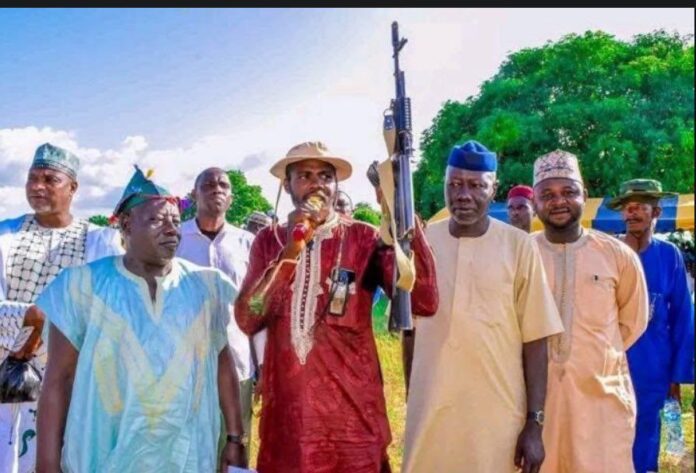For years, the mention of Kurfi Local Government Area in Katsina State evoked images of anguish—burnt homesteads, grieving families, and farmers too scared to step into their fields. Once a peaceful farming hub, Kurfi became a frontline community trapped in a deadly cycle of violence unleashed by armed groups hiding in its forests.
But on Thursday, hope finally returned. A landmark reconciliation meeting at Dajin Wurma forest saw armed Fulani leaders and community representatives embrace peace, promising to end years of bloodshed, kidnappings, and reprisals that had crippled the area.
The peace meeting drew an extraordinary crowd: traditional rulers, political leaders, Fulani forest commanders, elders, women, and restless youths. At its helm were the Maradin Katsina and Hakimin Kurfi, Alhaji Mansur Amadu Kurfi, and the Chairman of Kurfi LGA, Hon. Babangida Abdullahi Kurfi, who both described the accord as a turning point.
“This peace is for maslaha—the collective interest of our people. We have suffered too long. It is time to rebuild trust and live together without fear,” declared Alhaji Mansur Amadu Kurfi, his words resonating across the tense gathering.
For years, Fulani groups in Kurfi’s forests were associated with raids, cattle rustling, and kidnappings that forced thousands to flee. On Thursday, however, their leaders publicly disavowed violence.
Figures such as Alhaji Usman Kachalla Ruga, Sani Muhindinge, Yahaya Sani (popularly called Hayyu), and Alhaji Shu’aibu stood before the people and pledged a new path.
“From today, we will live in peace. We will not attack, kidnap, or take revenge,” one leader promised. “We will protect our people and allow farmers to return to their fields without fear.”
The leaders also committed to freeing remaining kidnap victims, a move that drew sighs of relief from families long torn by uncertainty.
Kurfi’s LGA Chairman, Babangida Abdullahi Kurfi, described the reconciliation as “the beginning of a new chapter,” pledging to tackle the needs of Fulani communities living in forests—health care, education, and rehabilitation programs.
In a symbolic gesture, he directed that Fulani groups should henceforth have free access to Kurfi town, assuring them of safety and dignity.
“This peace must be sustained,” he said firmly. “Our people deserve to live without fear, and we will do everything possible to make that happen.”
Kurfi’s story is a microcosm of the broader crisis plaguing Nigeria’s North West. For nearly a decade, rural communities in Katsina, Zamfara, and Kaduna have endured raids by heavily armed groups. Banditry escalated from simple cattle rustling into mass kidnappings for ransom, village burnings, and deadly reprisals.
Kurfi, with its vast farmlands and bordering forests, became a hotbed. Farmers abandoned their fields. Local markets collapsed. Families were displaced, moving into safer but overcrowded towns. At one point, life in Kurfi seemed to grind to a halt.
Unlike previous government-led initiatives, Thursday’s meeting was community-driven, involving direct dialogue between those at the center of the conflict. Analysts believe this grassroots approach offers the best chance of lasting peace.
“Peace imposed from outside rarely lasts. What happened in Kurfi is different—it is local leaders, traditional rulers, and Fulani commanders themselves deciding to end the bloodshed,” explained a security observer in Katsina.




